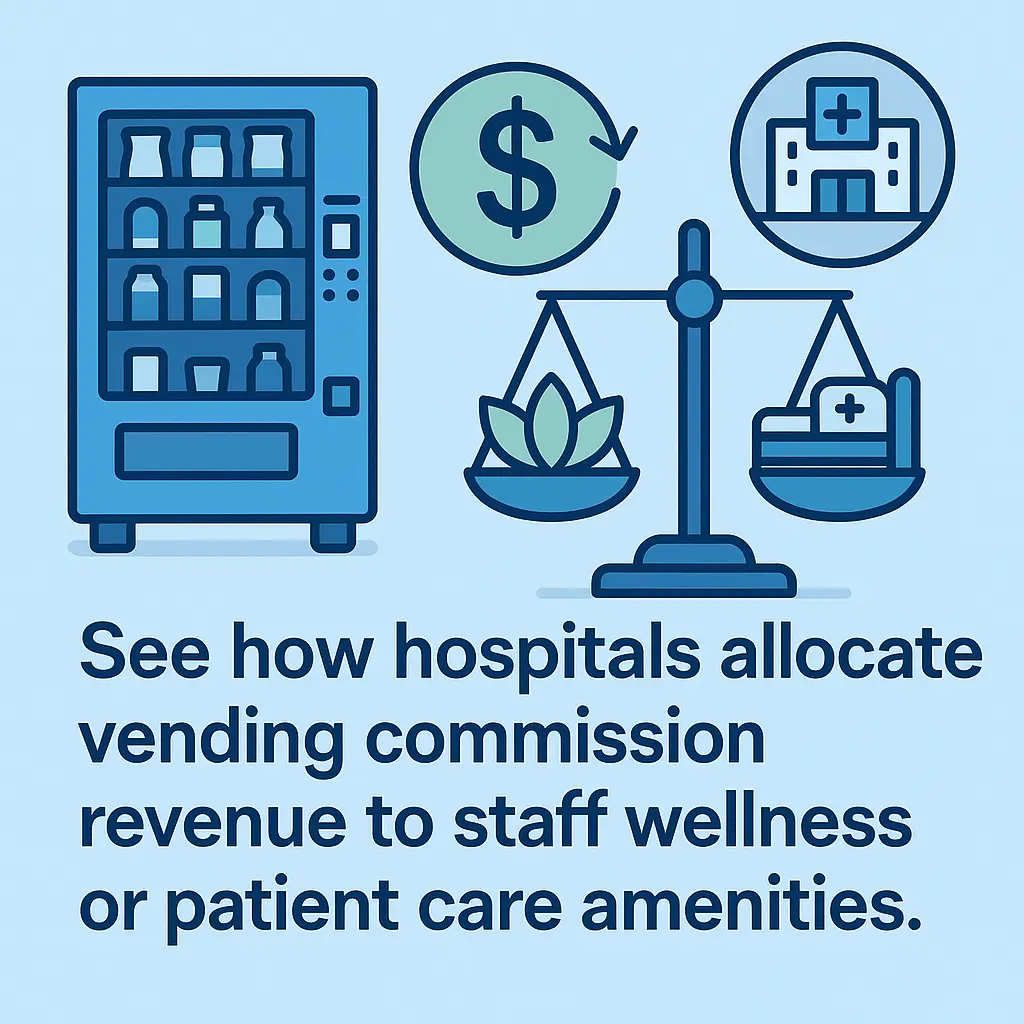Vending Machine Revenue Use in Hospitals
See how hospitals allocate vending commission revenue to staff wellness or patient care amenities.
Back to Vending for Healthcare ResourcesSee how hospitals allocate vending commission revenue to staff wellness or patient care amenities.
Back to Vending for Healthcare ResourcesHospitals often use vending commissions for wellness programs, staff support, or small improvements that directly benefit patients and visitors.
![]() Hospitals often reinvest vending revenue into staff wellness initiatives
Hospitals often reinvest vending revenue into staff wellness initiatives
![]() Revenue may support patient amenities like waiting room comfort upgrades
Revenue may support patient amenities like waiting room comfort upgrades
![]() Clear policies ensure vending income benefits the broader hospital community
Clear policies ensure vending income benefits the broader hospital community

Hospitals often receive commission revenue from vending machines located throughout their campuses. While the amounts may vary, these funds can provide meaningful support when directed toward initiatives that improve staff satisfaction or patient experiences. Understanding how to allocate this income responsibly is essential for maintaining transparency and maximizing community benefit.
One common use of vending commissions is funding staff wellness programs. Hospitals may purchase fitness equipment, sponsor wellness challenges, or provide healthier meal options in staff areas. These initiatives can boost morale, reduce stress, and improve overall productivity among healthcare workers. Since staff are essential to patient outcomes, supporting their well-being through vending income is a logical investment.
Another important area of investment is patient amenities. Commission funds are sometimes directed toward upgrading waiting rooms, adding comfortable seating, or providing entertainment options for families during long hospital visits. Even small improvements can reduce anxiety and create a more welcoming atmosphere for patients and visitors alike.
Hospitals must also consider ethical guidelines when allocating vending income. Clear policies ensure that funds are used transparently and equitably across departments. For example, many institutions dedicate revenue to shared spaces rather than specific units, ensuring fairness for staff and patients alike. Establishing policies not only avoids conflict but also demonstrates the hospital’s commitment to community benefit.
Some hospitals have used revenue to support hydration stations, encourage healthier snack alternatives, or expand wellness initiatives beyond the cafeteria. Others apply funds toward sustainability projects, creating long-term value for both the institution and its stakeholders. Reviewing successful examples can help administrators make informed decisions about where revenue will have the greatest impact.
For additional insights into related healthcare vending strategies, see how wellness-focused beverage options can support recovery and staff energy. Another useful perspective comes from managing vending across multiple hospital locations, which highlights operational challenges that may affect revenue distribution.
If you're exploring vending options for your business, Vending Exchange can help simplify the process. Delivery, Installation and Equipment is provided at no cost to you - vendors provide the machines, keep them stocked, and handle all servicing. Whether you need a provider or full-service management, just fill out the form on this page to get started.
Revenue varies by location, foot traffic, and product mix, but even modest commissions can add up to fund small wellness or patient care initiatives.
Yes, hospitals often allocate these funds toward staff gyms, relaxation spaces, or healthy meal options.
Many hospitals invest vending income into waiting rooms, visitor lounges, or small comfort items for patients.
Hospitals typically follow internal policies and ethical guidelines to ensure funds are used transparently and equitably.
Establishing clear allocation policies and involving staff committees helps guide spending decisions and measure impact.
Yes, some hospitals use funds to install hydration stations, recycling programs, or energy-saving equipment.
Most hospitals apply revenue toward shared spaces and broad initiatives to ensure fairness across departments.
Yes, funds may be used to expand healthy snack or beverage options available to staff and visitors.
Many use internal reporting systems and wellness surveys to evaluate the effectiveness of spending choices.
Generally, vending revenue is better suited for smaller wellness or comfort upgrades rather than large-scale infrastructure.